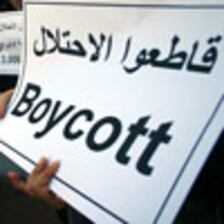The Electronic Intifada 6 January 2011
The Danish-British security firm G4S recently confirmed in a letter its involvement in the Israeli occupation and violations of international law — reported on last month by The Electronic Intifada.
After the publication of The Electronic Intifada’s report on 15 December 2010, the Business & Human Rights Resource Centre asked G4S to respond to the investigation as well as a 28 November 2010 article published by Press TV (“ ‘Firm sold torture instruments’”).
Within a week G4S replied, confirming that it had withdrawn from contracts providing security officers to residential settlements in the West Bank in 2002. “However, we continue to serve major commercial customers, for instance supermarket chains, whose operations include the West Bank,” the company stated (the letter can be downloaded from the Business & Human Rights Resource Centre’s website).
G4S claims in its letter that the commercial clients in illegal Israeli settlements in the occupied West Bank serve the general public. The company wrote that contracts include the provision of security officers to protect the premises of “commercial clients who serve the general public” in the occupied West Bank. However, G4S fails to address that Israeli settlements serve an exclusively Jewish population and are built illegally on occupied Palestinian land.
By providing security services to illegal settlement businesses, G4S facilitates Israel’s violations of international law. In 2004, the International Court of Justice (ICJ) reaffirmed the illegality of the construction of the wall and settlement colonies in the occupied West Bank, including East Jerusalem. According to the ICJ, construction activities should stop immediately and the wall and settlements be dismantled.
G4S tries to downplay its involvement by stating that the number of security officers deployed in the West Bank is “generally less than twenty and currently stands at eight.” However, violation of international law remains a violation, no matter the size.
G4S further attempts to evade responsibility by stating that it does “not carry out police or military-style patrols anywhere in the West Bank.” The company provides security officers to protect police facilities “from time to time,” but they do not perform any kind of law enforcement or public security role, the company stated. G4S also confirmed it provided security equipment, including X-ray machines and body scanners, with associated maintenance services, to the Israeli police, prison service and Ministry of Defense. In its letter the company adds, “We do not control, nor are we necessarily aware, where this equipment is deployed as it may be moved around the country.”
The feigned ignorance about where the equipment is deployed is contrary to the detailed information mentioned in a G4S promotional brochure it distributed this summer.
In the brochure, published by the Danish watchdog DanWatch, G4S describes the supply of a perimeter defense system for the walls around the Ofer prison compound and the installation of a central command room to monitor the entire Ofer compound. In addition, the company writes it also provided all the security systems in Ketziot prison and a central command room in Megiddo prison (G4S delivers technology to Israeli prisons,” DanWatch, 21 November 2010).
G4S boasts that the three prisons can detain 2,700-3,700 “security” prisoners — the majority of whom are Palestinians from the occupied West Bank and Gaza Strip illegally transferred to detention centers within Israel’s internationally-recognized boundary. International humanitarian law forbids an occupying power from transferring prisoners outside of the occupied territory and the conditions in Israeli prisons do not meet international legal standards. Accordingly, G4S’s involvement in the Israel Prison Service apparatus abets violations of international law.
G4S’s promotional material contradicts its claim that it does not know where its X-ray machines and body scanners are used. Who Profits? — a project of the Israeli Coalition of Women for Peace — has also documented that G4S luggage scanning equipment and full body scanners are used at checkpoints in the occupied West Bank towns of Qalandiya, Bethlehem and Irtah. G4S also provided full body scanners to the Erez checkpoint at Gaza. Who Profits? told The Electronic Intifada that this information is published in G4S’s own website and brochures.
The ICJ affirmed in 2004 that Israel’s wall and checkpoint regime in the West Bank impede Palestinians of “the right to work, to health, to education and to an adequate standard of living” and are contrary to international law.
G4S also revealed in its letter to the Business & Human Rights Resource Centre that it sells security equipment “with associated maintenance services.” In order to provide maintenance service, G4S presumably must know where the equipment is deployed. By providing maintenance service for years after the installment of the security equipment, G4S continues to facilitate Israel’s violations of international law.
Meanwhile, new research by Who Profits? shows that in 2009 G4S won a tender for providing central control rooms to all the prisons and detention facilities of the Israeli Prison Authority (“G4S Technologies will provide security systems for the prisons and the detention facilities of the Israeli Prison Authority,” G4S website). Therefore, G4S security equipment is deployed in every Israeli prison and detention facility.
G4S’s response to the revelations of its involvement in human rights violations shows the company is not heeding the responsibilities that come with its endorsement of the principles of the UN Global Compact. According to the first two principles of the compact — is a strategic policy initiative launched in 2000 for businesses that are committed to sustainability and responsible business practices — G4S should support and respect the protection of international human rights within its spheres of influence and make sure it is not complicit in human rights abuses.
G4S can expect to come under pressure from the growing boycott, divestment and sanctions movement until it untangles itself from Israel’s brutal occupation.
Adri Nieuwhof is a consultant and human rights advocate.





